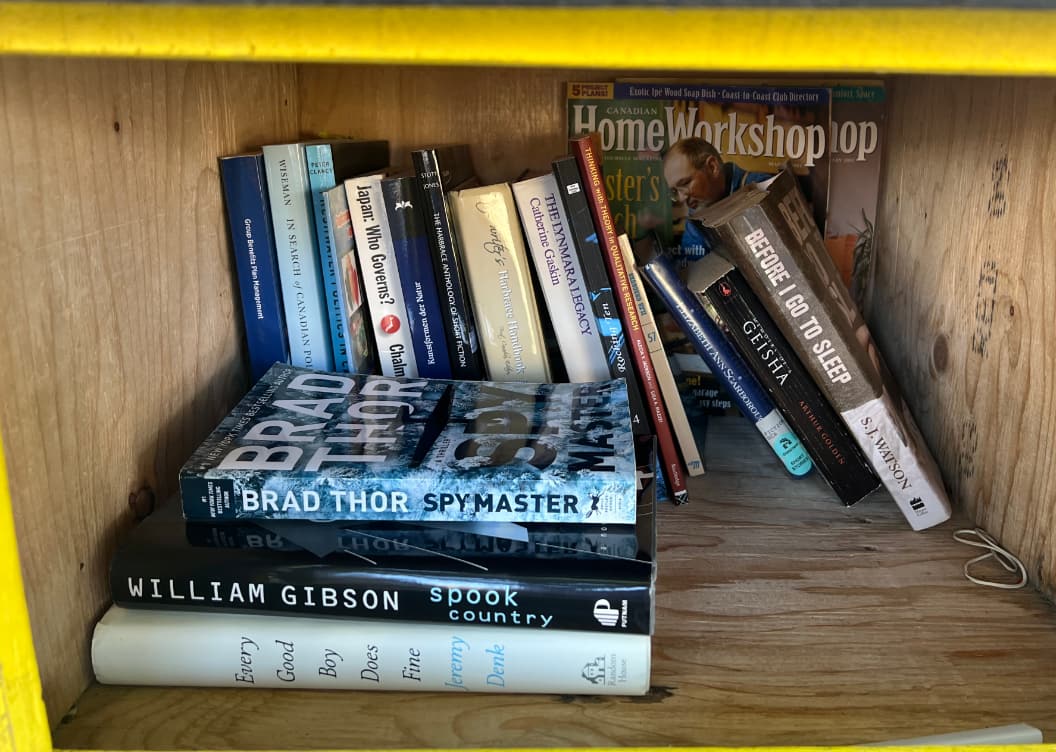During the summer I like to sit outside and read physical books on paper. There's something lovely about sunlight shining on white pages in fresh air. Our summers are short enough in Nova Scotia that it's worth finding good ways to enjoy them properly, and reading outdoors is one of mine.
I started doing this about a decade ago as I worked my way through the entire Aubrey-Maturin series by Patrick O'Brian. I finished the whole series a few years ago but have kept up the tradition with other books. We certainly don't have a shortage of books at home, but I sometimes check out our local Little Free Libraries in case there's something fun or interesting. I like to start the summer reading season with something breezy, and this year it was Brad Thor's thriller "Spy Master". I decided to follow that with a book I picked up in the remainder pile at Indigo many years ago but never quite got around to reading until now: William Gibson's 2007 novel "Spook Country".
I enjoyed Gibson's earlier cyberpunk stories, as well as his more recent "The Peripheral" (both on the page and the screen), set in various kinds of future. "Spook Country" is from the period in the early 2000s when reality had caught up with his particular interests and aesthetic, and he started writing books set in the present. He started this with "Pattern Recognition" in 2003, and this is sort of a sequel.
I was surprised to find "Spook Country" and the Brad Thor book both involve international secret agents and both have extremely short chapters. The short chapters in the Thor book make for a high density of cliffhangers, but in Gibson they're frequent opportunities to catch your breath: his prose is dense and allusive and there are lots of references and interesting wordplay - which makes it fun to read, but it isn't necessarily easy.
"Spook Country" may be set in the "present" (of 2007) but it's still on the leading edge, a step or two into the future. One of the plots involves an artist who makes "locative art" with GPS trackers and Augmented Reality headsets, which is actually something I've worked on myself in the last few years. Of course I didn't need lots of custom tech and multiple devices - it all works on iPhones.
Smartphones are the one big thing that felt most jarring about reading "Spook Country" - it was written right before the iPhone was announced, and their lack in what is otherwise a very technologically advanced storyline is palpable. One very wealthy character has a Palm Treo, but otherwise everyone is mostly using flip phones. Someone steals one at one point and is able to just open it up and browse the calls list without needing a passcode or fingerprint or anything. I had to remind myself that that's what phones used to be like back in the day.

Whenever I read any pre-2008 William Gibson, I often take out and ponder my iPhone. I don't even turn it on, I just turn it around in my hand and I reflect on the design and the amount of raw potential of technology and culture that it contains. Smartphones, especially iPhones, are such a perfect example of precisely the kinds of things William Gibson has obsessed over all these years, they feel like they've come right out of the pages of his books.
It may be ironic to read a William Gibson book on paper in bright sunlight, rather than on some kind of digital device, indoors and by the glow of LEDs, but it makes for a nice way to enjoy the summer.
After I finished it I took it and some of my other summer reading out to the Little Free Library where they can circulate back into the flow.
